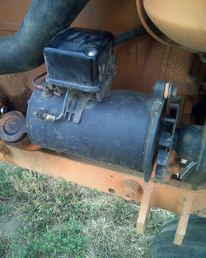Anonymous-0
Well-known Member
Ok. Is it just me or does everybody else fight voltage regulators on tractors.
I have a 6 volt generator on my MM UTU, it is not the correct generator for the tractor and it lost its Identification tag, but it still works/should work. Last week it worked fine, this week nothing. I did replace the battery, but it worked fine for the next few days after. Today nothing. This generator / regulator has been checked out and gone through by about 3 diferent guys in the last 3 years. They check out the generator and sell me a new regulator. It might work for a year then I start having problems again. Half the guys at the repair shops say why are you bothering, just convert it to 12 volts. I would like to keep it a little bit original, besides when it works it works fine and when the battery is fresh it has plenty of cranking power. It is only when the generator/regulator starts giving me problems that the battery power goes down and won't start.
Ok. I am ranting here but how long would you expect a voltage regulator to last? I do live in a wet climate and it does get abused sometimes by being left out in the rain.
Also I have a Co-Op E-3 with a regulator that at an idle shows slight discharge, if I hold steady at about 1/3 throttle shows +8amps steady, and full throttle the needle jumps between 0 and 8, might hold on +8 for 5 seconds then jumps back and forth for 5 seconds. Sometimes (1 in 15 starts) the generator will not put out anything until I tap on the regulator. Is this normal?
Are these just bad regulators? How is it that I am this unlucky? Did farmers put up with this in the day, or are we just getting junk regulators today? Is there any maintenance that I need to do to my regulators? If you don't have any advice, am I alone with these problems?
Sincerly,
Pulling my hair out.

I have a 6 volt generator on my MM UTU, it is not the correct generator for the tractor and it lost its Identification tag, but it still works/should work. Last week it worked fine, this week nothing. I did replace the battery, but it worked fine for the next few days after. Today nothing. This generator / regulator has been checked out and gone through by about 3 diferent guys in the last 3 years. They check out the generator and sell me a new regulator. It might work for a year then I start having problems again. Half the guys at the repair shops say why are you bothering, just convert it to 12 volts. I would like to keep it a little bit original, besides when it works it works fine and when the battery is fresh it has plenty of cranking power. It is only when the generator/regulator starts giving me problems that the battery power goes down and won't start.
Ok. I am ranting here but how long would you expect a voltage regulator to last? I do live in a wet climate and it does get abused sometimes by being left out in the rain.
Also I have a Co-Op E-3 with a regulator that at an idle shows slight discharge, if I hold steady at about 1/3 throttle shows +8amps steady, and full throttle the needle jumps between 0 and 8, might hold on +8 for 5 seconds then jumps back and forth for 5 seconds. Sometimes (1 in 15 starts) the generator will not put out anything until I tap on the regulator. Is this normal?
Are these just bad regulators? How is it that I am this unlucky? Did farmers put up with this in the day, or are we just getting junk regulators today? Is there any maintenance that I need to do to my regulators? If you don't have any advice, am I alone with these problems?
Sincerly,
Pulling my hair out.


